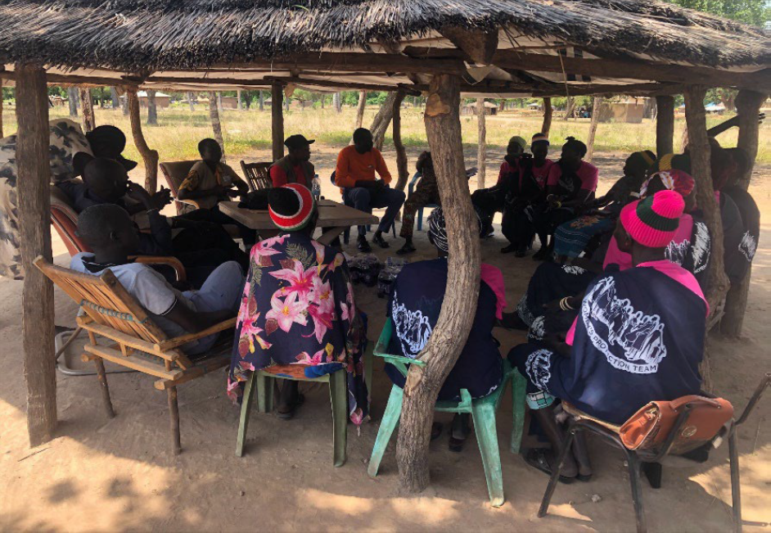Women in Rumbek: Safety, Advocacy, and Peacebuilding
Women’s Influence and Safety Increased Through Engagements With Local Leadership In Rumbek

Insecurity in Rumbek: A Daily Threat
Rumbek, the capital of Lakes State, has been plagued by insecurity from persisting intercommunal violence, including cattle raids, revenge attacks, and the proliferation of firearms. These issues negatively affect the safety of the population daily, limiting their access to services and livelihoods, and causing displacement and fear. Women are often targeted during violent conflict, where gender-based violence (GBV) is exacerbated by restrictive gender norms and stereotypes, relegating women and girls to secondary citizenship. When women become survivors of GBV, stigmatization impedes them from accessing basic health services and legal remedies.
Engaging Stakeholders to Improve Safety
To increase the safety of women in Rumbek, Nonviolent Peaceforce (NP) engages with key stakeholders in the community regularly, including chiefs, local authorities, and youth leaders. Trainings are conducted with representatives from different payams on Unarmed Civilian Protection (UCP), including sessions on how to prevent, mitigate, and respond to GBV. Women Protection Teams (WPTs) were also introduced to local leaders in each of the payams. During these meetings, the work of the WPTs was explained, and entry points for collaboration with local leadership were identified to increase their network and legitimacy as peacemakers in the community.
A chief from one of the payams has become an active ally of the WPT members and appreciated NP for the trainings on how to best support their communities to live peacefully. He noted:
“We wholeheartedly thank NP for training us! NP has strengthened our capacity to protect ourselves and also the community at large. We know how to deal with violence in a nonviolent manner so that our communities can live peacefully” (Malok village, Matangai payam, 29 March 2022).
Improving GBV Case Management
Following the trainings offered by NP to local authorities and the community, the WPTs have noted increased knowledge in handling GBV cases, especially by the chiefs in their areas. Previously, WPT members would learn about potential GBV cases through gossip at the village square, posing a number of privacy and protection threats for the involved survivor(s).
Now, a WPT member from Matangai payam noted, when a GBV case is reported to the community leaders, they notify the WPT immediately. Representatives of the WPT are then asked to support the case to ensure it is handled with care. The WPT member further noted feeling more appreciated and able to exert influence during matters of community importance:
“Ever since our community leaders have been trained, they now call us for meetings and tell us to handle some cases involving women. It’s good because this means women are free to get help” (Malok village, Matangai payam, 29 March 2022).
Joint Advocacy for Food Security
The increased involvement and influence women are able to exert was also found in multiple joint advocacy efforts between local leaders and the WPT in Matangai payam. For example, WPT members and local leaders discussed the pressing food insecurity in Matangai payam, after which the WPT and community leaders took the initiative to form a group of 120 members comprising the local population, paramount and executive chiefs, and other local leaders.
The group is currently identifying and advocating for further agricultural skills training to open a joint communal farm on which they can cultivate and participate in subsistence farming. This will support the development of a more sustainable livelihood for the community as well as forming an incentive for increased social cohesion and peaceful relations within the community.
Women’s Role in Leadership and Advocacy
Within this initiative, women will continue to have a prominent role in decision-making and social cohesion activities. Using the knowledge and capacity that they developed in collaboration with NP, the WPTs successfully advocated for support from local leaders and development partners. For example, they were provided with four ox ploughs by a partner organization to start cultivation. WPTs attributed their success to their increased network and the trust-building exercises that Nonviolent Peaceforce organized between them and community leadership.
The women also noted that the success of advocacy efforts on their part means that women in the community have the capacity to support themselves and their families and to be independent. One of the WPT members said:
“Hunger has been a pressing issue in Matangai Payam, and people have become desperate for food. We decided to use the advocacy skills obtained from an NP training to reach out to another organization to obtain support for subsistence agriculture and protect the community from hunger” (Rumbek Central, 4 April 2022).
Nonviolent Peaceforce will continue working with various local actors and community protection teams through trainings and trust-building to enhance women’s and community’s safety, creating the conditions for durable peace.
